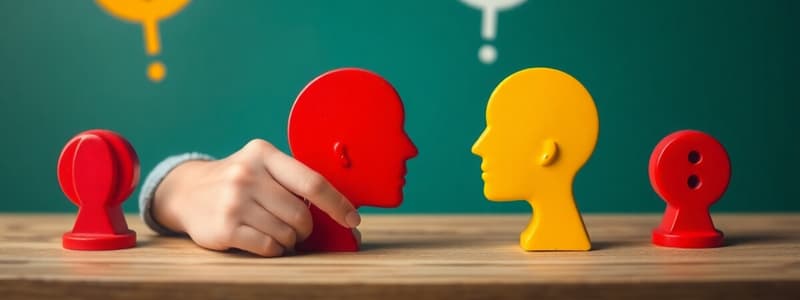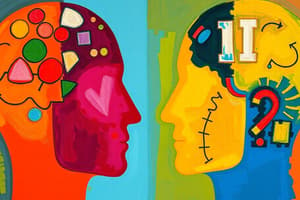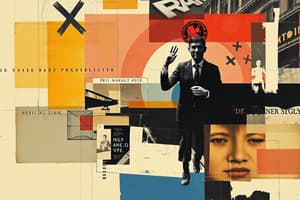Podcast
Questions and Answers
What does the overconfidence bias primarily involve?
What does the overconfidence bias primarily involve?
- Holding positive yet unrealistic beliefs about oneself (correct)
- Avoiding costs associated with decision making
- Believing past outcomes could have been predicted
- Underestimating the challenges faced in decision making
Which bias involves focusing on the most recent events to make decisions?
Which bias involves focusing on the most recent events to make decisions?
- Hindsight Bias
- Anchoring Effect
- Availability Bias (correct)
- Framing Bias
What is the primary characteristic of the confirmation bias?
What is the primary characteristic of the confirmation bias?
- Seeking information to support previous decisions (correct)
- Ignoring initial information during decision making
- Focusing on random events without evidence
- Evaluating past choices critically
How does the framing bias affect decision making?
How does the framing bias affect decision making?
Which of the following biases can lead to significant errors in evaluating past decisions?
Which of the following biases can lead to significant errors in evaluating past decisions?
What does the sunk cost error pertain to in decision making?
What does the sunk cost error pertain to in decision making?
Which bias involves creating meaning from random events without substantial evidence?
Which bias involves creating meaning from random events without substantial evidence?
What is the effect of the self-serving bias in an individual's assessments of their actions?
What is the effect of the self-serving bias in an individual's assessments of their actions?
What is primarily involved in the representation bias?
What is primarily involved in the representation bias?
Which bias is characterized by focusing on information that supports previous decisions?
Which bias is characterized by focusing on information that supports previous decisions?
What does the availability bias primarily influence in decision making?
What does the availability bias primarily influence in decision making?
Which bias results in mistakenly believing that an event was predictable after its outcome is known?
Which bias results in mistakenly believing that an event was predictable after its outcome is known?
Which of the following biases involves the behavior of discounting unfavorable circumstances when evaluating performance?
Which of the following biases involves the behavior of discounting unfavorable circumstances when evaluating performance?
What is the main consequence of the anchoring effect in decision-making?
What is the main consequence of the anchoring effect in decision-making?
What is a primary characteristic of the immediate gratification bias?
What is a primary characteristic of the immediate gratification bias?
Which bias involves interpreting situations according to what one already believes or expects?
Which bias involves interpreting situations according to what one already believes or expects?
Flashcards
Heuristics
Heuristics
Using simplified rules to make decisions quickly, often based on past experiences.
Overconfidence Bias
Overconfidence Bias
Overly positive view of oneself and their abilities, leading to underestimation of risks.
Immediate Gratification Bias
Immediate Gratification Bias
Choosing options that offer immediate rewards, even if long-term consequences are negative.
Anchoring Effect
Anchoring Effect
Signup and view all the flashcards
Selective Perception Bias
Selective Perception Bias
Signup and view all the flashcards
Confirmation Bias
Confirmation Bias
Signup and view all the flashcards
Framing Bias
Framing Bias
Signup and view all the flashcards
Availability Bias
Availability Bias
Signup and view all the flashcards
Self-Serving Bias
Self-Serving Bias
Signup and view all the flashcards
Sunk Cost Error
Sunk Cost Error
Signup and view all the flashcards
Hindsight Bias
Hindsight Bias
Signup and view all the flashcards
Representation Bias
Representation Bias
Signup and view all the flashcards
Study Notes
Decision-Making Errors and Biases
- Heuristics: Using simplified rules of thumb to make decisions.
- Overconfidence Bias: Holding unrealistically positive views of oneself and one's performance.
- Immediate Gratification Bias: Choosing alternatives that offer immediate rewards and avoiding immediate costs.
- Anchoring Effect: Fixating on initial information and ignoring subsequent information.
- Selective Perception Bias: Selecting, organizing, and interpreting events based on the decision-maker's biased perceptions.
- Confirmation Bias: Seeking out information that reaffirms past choices and discounting contradictory information.
- Framing Bias: Selecting and highlighting certain aspects of a situation while ignoring other aspects.
- Availability Bias: Losing decision-making objectivity by focusing on the most recent events.
- Representativeness Bias: Drawing analogies and seeing identical situations when none exist.
- Randomness Bias: Creating unfounded meaning out of random events.
- Sunk Costs Error: Forgetting that current actions cannot influence past events and relate only to future consequences.
- Self-Serving Bias: Taking quick credit for successes and blaming outside factors for failures.
- Hindsight Bias: Mistakenly believing that an event could have been predicted once the actual outcome is known (after-the-fact).
Studying That Suits You
Use AI to generate personalized quizzes and flashcards to suit your learning preferences.




